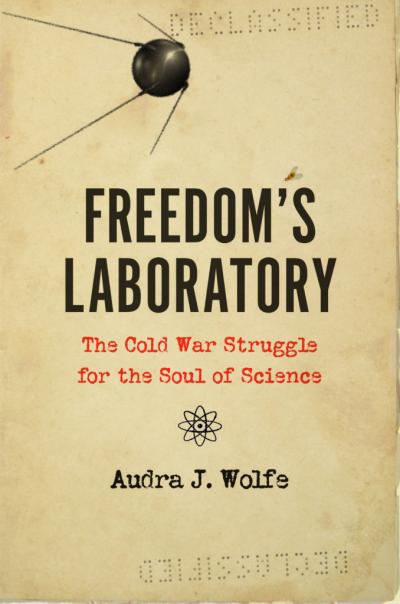
Listen to historian Audra Wolfe as she examines how science was defined and used as a tool of cultural diplomacy and international relations during the Cold War.

Listen to historian Audra Wolfe as she examines how science was defined and used as a tool of cultural diplomacy and international relations during the Cold War.
 Audra J. Wolfe, Ph.D., is a Philadelphia-based writer, editor, and historian. She is the author of two books on science and the Cold War, Competing with the Soviets: Science, Technology, and the State in Cold War America and Freedom's Laboratory: The Cold War Struggle for the Soul of Science, both available from Johns Hopkins University Press. You can follow her on Twitter as @ColdWarScience and subscribe to her newsletter at Never Just Science dot substack dot com.
Audra J. Wolfe, Ph.D., is a Philadelphia-based writer, editor, and historian. She is the author of two books on science and the Cold War, Competing with the Soviets: Science, Technology, and the State in Cold War America and Freedom's Laboratory: The Cold War Struggle for the Soul of Science, both available from Johns Hopkins University Press. You can follow her on Twitter as @ColdWarScience and subscribe to her newsletter at Never Just Science dot substack dot com.
In this episode of Perspectives, we sit down with Audra Wolfe to discuss her book, Freedom's Laboratory: The Cold War Struggle for the Soul of Science. In Freedom's Laboratory, Dr. Wolfe examines the relationship between science, politics, and governance in the United States during the Cold War, highlighting the ways in which scientists, policymakers, and administrators defined and thought about concepts such as "scientific freedom" and "Western science." She examines the role of scientists in American cultural diplomacy after World War II, at a time when United States propaganda promoted a vision of science as empirical, objective, and international. This view of science was often contrasted with a representation of Soviet science as politically motivated and nationalistic.
Dr. Wolfe adds to our knowledge of how science and propaganda, psychology and diplomacy, interacted with one another and were deployed on both sides during the Cold War. Weaving diplomatic history with the history of science, Wolfe's book demonstrates the powerful and controversial uses and abuses of science during the Cold War.
This podcast features a number of questions from Daniel Sanford, a systems administrator.
To cite this content, please use footnote:
Audra Wolfe, interview, Perspectives, Consortium for History of Science, Technology and Medicine, March 11, 2021, /video/112.
Closed-captioning available on Youtube.
The Consortium's collections provide many opportunities to learn more about the history of Cold War science, diplomacy, and propaganda.
Our cross-institutional search tool allows researchers to investigate materials across multiple institutions from a single interface. With more than 4.4 million catalog records of rare books and manuscripts, the Consortium's search hub offers scholars and the public the ability to identify and locate relevant materials.
Milislav Demerec Papers, American Philosophical Society
Leslie C. Dunn Papers, American Philosophical Society
Genetics Society of America Records, American Philosophical Society
Bentley Glass Papers, American Philosophical Society
Detlev Bronk Papers, Rockefeller Archive Center
Ford Foundation Archives, Rockefeller Archive Center
Rockefeller Foundation Archives, Rockefeller Archive Center
Nelson A. Rockefeller Papers, Rockefeller Archive Center
Arnold B. Grobman Papers, Smithsonian Institution
Ekaterina Babintseva, Computer-Based Education in the Cold War United States and Soviet Union: Cyberdreams of the Information Age
Joseph Martin, Solid State Insurrection: How the Science of Substance Made American Physics Matter
© 2025 Consortium for History of Science, Technology and Medicine | Copyright Infringement